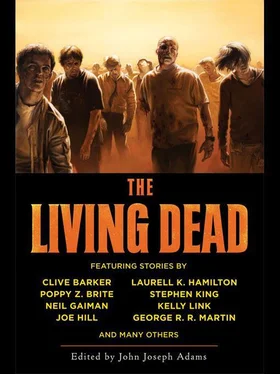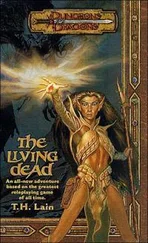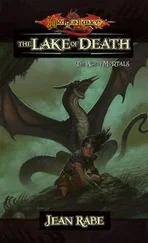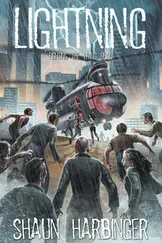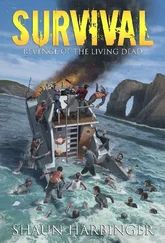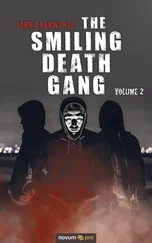Robbie was old enough to understand what was on the radio, and even Brian picked up on more than you expected. I didn’t want to expose them to something like that. As it was, they heard too much from the other kids in the neighborhood, especially the McDonald girls. Alice, their mother, was one of those parents who likes to pretend they’re treating their kids with what they call respect, when really, all they’re doing is exposing them to all kinds of things they’re too young to handle. A parent—a mother isn’t supposed to—that’s not your job. Your job—your duty, your sacred duty—it is your sacred duty to protect those children, to keep them safe no matter what—you have to protect them, no matter—
Well, I was. With the generator running, I could let them watch a DVD, which had gone from a daily occurrence—sometimes twice-daily—to a treat like going to the movies had been when I was their age. They were so thrilled Robbie was willing to sit down to The Incredibles , which Brian adored but didn’t do anything for her. So with the two of them safely seated in front of the TV, I was safe to turn on the radio, low, and try to catch up with what news I could as the water came to a boil.
And you know, the news wasn’t bad. I wouldn’t call it good, exactly, but the National Guard seemed to be making progress. They’d held onto Orlando; although apparently Disney World was the worse for it; and had caught a significant number of the eaters on one of the major highways—I can’t remember the number; it may have been Highway 1—where they’d brought in the air power, let the planes drop bombs on the eaters until they were in so many microscopic pieces. Given what we learned about them in the weeks after, this was about the worst thing that could have happened, since it spread bits of them and their infection to the four winds, but at the time, it sounded like a step forward. There was talk of retaking Mobile; a team of Navy SEALs had rescued a group of survivors holed up in City Hall, and a squad of Special Forces had made an exploratory journey into the city that had brought them to within sight of the harbor. Of course, the powers-that-be are going to tell you that things are better than they are, but I was willing to believe them.
I heard the truck pull up outside, heard the slow rumble of its engine, the squeal and hiss of its air brakes. I noticed it, but I wasn’t especially concerned. The Rosses had sold their house across the street to a couple from the City who supposedly had paid them almost a million dollars for it. The news made our eyes goggle; Ted and I spent a giddy couple of hours imagining how we might spend our million. Once we went online to check housing prices in the Adirondacks, though, all our fantasies came crashing down. Up north, a million was the least you’d pay for a place not even half the size of ours. We knew Canada had closed the border, but we looked anyway. With the state of the U.S. dollar, it was more like 1.5 million for the same undersized house. It appeared we would be staying where we were. And we’d have new neighbors, whose moving truck had arrived.
Sometimes, I think about that driver. I don’t know anything about him—or her, it could have been a woman; although, for some reason, I always picture a man. Not a kid: someone in his fifties, maybe, kind of heavyset, with a crew cut that doesn’t hide the gray in his hair. He’s been around long enough to have seen all kinds of crises, which is why he doesn’t panic, keeps working through this one. No one else at the delivery company wants to make the drive upstate with him, risk the wilds to the north, but he’s happy to leave the City for a day. Everybody’s on edge. There are soldiers and heavily armed police clustered at all the docks, the airports, the train stations, the bus terminals. Everyone who arrives in the City is supposed to be examined by a doctor flanked by a pair of men who keep the laser-sights of their pistols centered on the traveler’s forehead for the duration of the exam. The slightest cause for concern—fever, swollen and tender glands, discolored tongue—is grounds for immediate quarantine. Protest, and those men to either side of the doctor are expressly authorized to put a pair of bullets in your head. What’s worse is, with the police largely off the streets, groups of ordinary citizens have taken it on themselves to patrol the City for eaters. They’ve given themselves license to stop and question anyone they consider suspicious, and if you ask what gives them the right, they’ll be only too happy to show you the business ends of their assorted pistols and rifles. There’s been at least one major shootout between two of these patrols, each of whom claimed they thought the other were eaters. Cops had to be pulled off port duty to bring it under control, which they did by shooting most of the participants.
I can’t imagine anything happened to the driver while he was in the City. My guess is, he passed through the checkpoints and was on his way without a hitch. It was a nice, early fall morning, the air cool but not cold, the leaves on the verge of losing their green, the sun bright but not oppressive. Maybe he had the radio on, was listening to one of the AM stations out of the City. He heard the news out of Florida and thought, I knew it . He decided to take the next exit, stop at a Dunkin’ Donuts for a celebratory coffee and a Boston Cream.
As he steered into the parking lot, maybe he noticed the absence of any other cars. Or maybe he saw the lights on in the donut shop and assumed he’d arrived during a lull in business. He parked the truck, climbed down from the cab, and walked toward the glass door. There are times I see him striding up to the counter, his eyes on the racks of donuts on the wall opposite him, not aware of anything unusual until he sees that all the racks are empty. In what feels to him like slow-motion, he turns to the tables to his right and takes in the floor slick with blood, the remains of the last patrons scattered across the tables. Then I think, That’s ridiculous—there’s no way he would not have seen all of that right away . The second he swung open the door, he would have smelled it. Chances are, he wouldn’t have had to go that far—he would have seen the blood splashed across the windows and immediately turned around. Either way—whether he bolts out of the place or walks away without going in—he would be distracted, shocked by what he’s (almost) seen. Maybe the closest he’s been to something like this has been an image on the TV. It’s the reason he doesn’t pick up on the feet dragging across the tarmac until the eater is out from around the front of the truck and practically on him. The driver’s eyes bulge; if he’s never been this close to such carnage, you can be sure he’s never had an eater lurching towards him, either. His feet catch on one another and he trips, which causes the eater to trip and fall on top of him. For one horrifying moment, he’s under the thing, under that stink, the teeth clacking in his ear as it tries to take a bite out of him, those hands pawing at him. He drives his right elbow back and up into its face. Fireworks of pain burst in his arm but the eater rolls off him. He scrambles to his feet, kicking at the eater’s hands as they try to drag him down again, and climbs up and into the truck’s cab. Maybe he jumps when the eater slaps the door, almost drops the keys his fingers can’t fit into the ignition. The eater pounds the door, throws itself against it, actually makes the truck rock ever-so-slightly. The key slides into place, the engine turns over, and the driver grinds the gears putting the truck into first. He speeds out of that parking lot so fast the rear end of the truck bashes a telephone pole, throwing open one of the rear doors and tumbling a couple of plastic crates out onto the road. His foot doesn’t leave the gas pedal. Let them take it out of his pay. His heart is hammering, his hands trembling on the wheel. If he smokes, he’s desperate for a cigarette; if he quit, he wishes he hadn’t; if he never has, he wishes he’d started.
Читать дальше
Конец ознакомительного отрывка
Купить книгу
